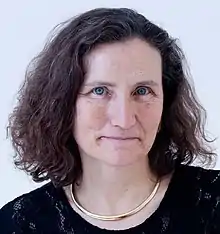Wendy Mackay | |
|---|---|
 Wendy Mackay in 2014 | |
| Born | Wendy Elizabeth Mackay May 25, 1956 |
| Nationality | Canadian |
| Citizenship | US / Canadian citizen |
| Alma mater | |
| Spouse | |
| Awards |
|
| Scientific career | |
| Fields | Human computer interaction[1] |
| Institutions | |
| Thesis | Users and customizable software : a co-adaptive phenomenon (1990) |
| Doctoral advisor | Wanda Orlikowski[2] |
| Website | ex-situ |
Wendy Elizabeth Mackay (born on May 25, 1956) is a Canadian researcher specializing in human-computer interaction.[1][3] She has served in all of the roles on the SIGCHI committee, including Chair. She is a member of the CHI Academy and a recipient of a European Research Council Advanced grant.[4][5] She has been a visiting professor in Stanford University between 2010 and 2012, and received the ACM SIGCHI Lifetime Service Award in 2014.[6]
She leads research at Exsitu, while serving as research director with INRIA Saclay in France. Her research investigates of human computer interaction (HCI)[1] and aims to develop and to facilitate the interfaces that provide users with the tools needed to accomplish the task at hand.[7][8]
Education
Mackay received a Bachelor of Arts degree in psychology from University of California, San Diego in 1977. She received a Master of Arts in experimental psychology from Northeastern University in 1979 and a Doctor of Philosophy in Management of Technological Innovation from Massachusetts Institute of Technology in 1990.[2][9] Her doctoral research was supervised by Wanda Orlikowski.
Career and research
After graduating from Northeastern University, Mackay worked in several roles at Digital Equipment Corporation (DEC). In 1983, she focused formed a multimedia research group there and became a visiting scientist at MIT. At DEC, she created over 30 multimedia projects, including the first interactive video system which was titled IVIS. From 1987 to 1990 she worked on her Ph.D. at MIT and eventually worked as a senior research scientist at Xerox PARC where she published an award-winning special issue of Communications of the ACM on computer augmented environments.[10] She also worked on augmented paper interfaces and explored the integration of paper with the online world.[11] Afterward, she taught at University of Aarhus, University of Paris-Sud, and Stanford University as a visiting professor.
Her scientific contributions include writing the original toolkit software for IVIS, the world's first interactive video system. She also conducted the first major study of electronic mail while at MIT.[12] Her design methods are taught in institutions around the world such as Stanford, MIT, Georgia Tech, and University of British Columbia. Mackay has published over two hundred research articles on human-computer interaction and has served as program chair or on the program committees of ACM Conference on Human Factors in Computing Systems (CHI), ACM Symposium on User Interface Software and Technology (UIST), ACM Computer-supported cooperative work (CSCW), ACM DIS and ACM Multimedia.
Awards and honors
- 2009, Elected a member of the CHI Academy[13]
- 2009, Conference on Human Factors in Computing Systems (CHI) best paper award, top 1% of accepted papers, for Musink: Composing Music through Augmented Drawing [14]
- 2011, SIGCHI Best Paper Award: Mid-air Pan-and-Zoom on Wall-sized Displays [15][16]
- 2014, SIGCHI Lifetime Service Award [6]
- 2019, ACM Fellow "for contributions to human-computer interaction, mixed reality and participatory design, and leadership in ACM SIGCHI".[17]
- 2020, Suffrage Science award[18]
Personal life
Wendy married Michel Beaudouin-Lafon on August 11, 1993 in Avalon, California. She has two sons - Alexandre and Matthew Thomas Beaudouin-Mackay.[19]
References
- 1 2 3 Wendy Mackay publications indexed by Google Scholar
- 1 2 Mackay, Wendy Elizabeth (1990). Users and customizable software : a co-adaptive phenomenon. mit.edu (PhD thesis). Massachusetts Institute of Technology. hdl:1721.1/14087. OCLC 60019520.
- ↑ Wendy Mackay at DBLP Bibliography Server
- ↑ "European Research Council Advanced grants". erc.europa.eu. 30 May 2023.
- ↑ "Creating Co-Adaptive Human-Computer Partnerships". cordis.europa.eu.
- 1 2 "2014 SIGCHI Awards". sigchi.org.
- ↑ Hutchinson, Hilary; Hansen, Heiko; Roussel, Nicolas; Eiderbäck, Björn; Mackay, Wendy; Westerlund, Bo; Bederson, Benjamin B.; Druin, Allison; Plaisant, Catherine; Beaudouin-Lafon, Michel; Conversy, Stéphane; Evans, Helen (2003). Technology probes. CHI '03: Proceedings of the SIGCHI Conference on Human Factors in Computing Systems. p. 17. doi:10.1145/642611.642616.
- ↑ Mackay, Wendy E. (1991). Triggers and barriers to customizing software. CHI '91: Proceedings of the SIGCHI Conference on Human Factors in Computing Systems. pp. 153–160. doi:10.1145/108844.108867.
- ↑ "Wendy Mackay's CV". lri.fr.
- ↑ Wellner, Pierre; Mackay, Wendy; Gold, Rich (1993). "Back to the real world". Communications of the ACM. 36 (7): 24–26. doi:10.1145/159544.159555. ISSN 0001-0782. S2CID 21169183.
- ↑ MacKay, Wendy E. (1999). "Is paper safer? The role of paper flight strips in air traffic control". ACM Transactions on Computer-Human Interaction. 6 (4): 311–340. doi:10.1145/331490.331491. ISSN 1073-0516. S2CID 2759800.
- ↑ Mackay, Wendy E. (1988). "Diversity in the use of electronic mail: a preliminary inquiry". ACM Transactions on Information Systems. 6 (4): 380–397. doi:10.1145/58566.58567. ISSN 1046-8188. S2CID 558592.
- ↑ "2009 SIGCHI awards". sigchi.org.
- ↑ Theophanis Tsandilas; Catherine Letondal; Wendy E. Mackay (2009). "Mus ink: Composing music through augmented drawing" (PDF). Proceedings of the SIGCHI Conference on Human Factors in Computing Systems. Boston, MA, USA: ACM. pp. 819–828. doi:10.1145/1518701.1518827. ISBN 9781605582467. S2CID 220980066.
- ↑ Mathieu Nancel; Julie Wagner; Emmanuel Pietriga; Olivier Chapuis; Wendy Mackay (2011). "Mid-air pan-and-zoom on wall-sized displays" (PDF). Proceedings of the SIGCHI Conference on Human Factors in Computing Systems. Vancouver, BC, Canada: ACM. pp. 177–186. doi:10.1145/1978942.1978969. ISBN 9781450302289. S2CID 218672063.
- ↑ "CHI'11 Best Paper Award". chi2011.org.
- ↑ 2019 ACM Fellows Recognized for Far-Reaching Accomplishments that Define the Digital Age, Association for Computing Machinery, retrieved 2019-12-11
- ↑ "Women in STEM: Professor Wendy Mackay recognised with Suffrage Science award". ex-situ.lri.fr.
- ↑ "Wendy Mackay's personal website". lri.fr.